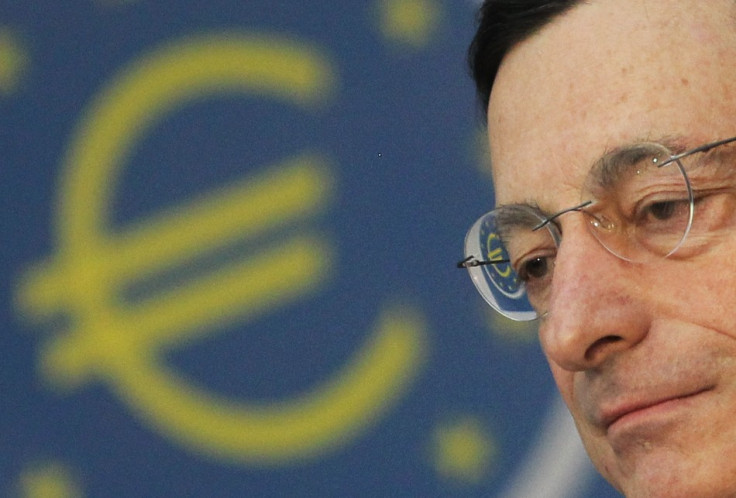Markets Doubt Eurozone as ECB's Mario Draghi Promises 'Worst is Over'

European Central Bank (ECB) chief Mario Draghi is insisting that the single currency is past the worst of its crisis, despite more bleak data suggesting the eurozone may be sliding back into recession.
European stock markets are falling, the eurozone purchasing managers index revealed a drop in private sector activity for February and many of its economies are mired in uncertainty and recession - with Ireland being the latest casualty.
China, one of Europe's biggest opportunities for growth given the emerging market's vast import requirements, has seen its manufacturing industry slow which could hinder any eurozone recovery.
"The worst is over, but there are still risks," Draghi said in an interview with German newspaper Bild.
"The situation is stabilising. Last autumn, the situation was really critical. It could have come to a dangerous credit crunch for the banks.
"As a result, businesses could have gone bankrupt, because they would have been left high and dry. We had to prevent that."
Currency traders certainly took some of the optimism to the foreign exchange markets this week, bidding-up the single currency to a three-week high of 1.3293 against the dollar and multi-day high of 109.02 against the Japanese yen.
That said, bond markets remain cautious of any quick return to recovery, particularly in the peripheral eurozone economies. Concerns over Spain's ailing economy and the looming shadow of a possible bailout as it teeters on the brink of recession have pushed Spanish 10-year bond yields up to 5.4 percent on 23 March.
Italy, which is also struggling to balance its books as it muddles through a recession - and who's steep austerity measures will soon be tested by public-sector strikes - has also seen a rise on its 10-year bond yields to 5.05 percent.
The UK hasn't been immune from the European maliaise, either, even if bond investors are relatlivey sanguine about Chancellor George Osborne's stewardship of the nation's finances after his third budget statement to the House of Commons Wednesday. Gilt yields have been largely unchanged in thin trading as the FTSE 100 has suffered its worst week of 2012, seeing its total value decline by around 2 percent. The contrast is yet another indication that the benchmark index is a much better refelction of global, rather than British, economic performance.
Elsewhere across Europe markets fell on 23 March.
Frankfurt's DAX lost 0.2 percent, Paris's CAC-40 was 0.4 percent down, and Spain's IBEX 35 index dropped 1 percent.
According to the latest flash purchasing managers index for the eurozone by Markit, economic output in the area fell from 49.3 in February to a three-month low of 48.7 in March.
"The eurozone economy contracted at a faster rate in March, suggesting that the region has fallen back into recession, with output now having fallen in both the final quarter of last year and the first quarter of 2012," Chris Williamson, chief economist at Markit, said.
"The downturn is only very mild at the moment, with the PMI signalling a drop in GDP of approximately 0.1 percent to 0.2 percent and an upturn in business confidence in the service sector provides hope that conditions may improve again later in the year.
"However firms are clearly focusing on cost reduction, with employment falling at the fastest rate for two years as inflows of new business continued to deteriorate, reflecting weak demand across the region."
Recently there has been a settling of market activity around the eurozone and - deceptively, some think - it looks like the problem may not be as bad as previously thought.
"The current lull does not indicate that the eurozone is in the clear, but rather it is simply in the eye of the storm, and more drama inevitably awaits," Megan Greene, senior economist at Roubini Global Economics, wrote on her blog.
"Ultimately, unless the fundamental structure of the eurozone is reformed so that political union leads to fiscal transfers or joint and several liabilities, this crisis will inevitably rage on."
Ireland is the latest casualty in the eurozone with the news that it is back in recession.
It joins others - including Italy, Portugal, and Belgium - struggling to find their feet after the financial crisis.
© Copyright IBTimes 2025. All rights reserved.






















